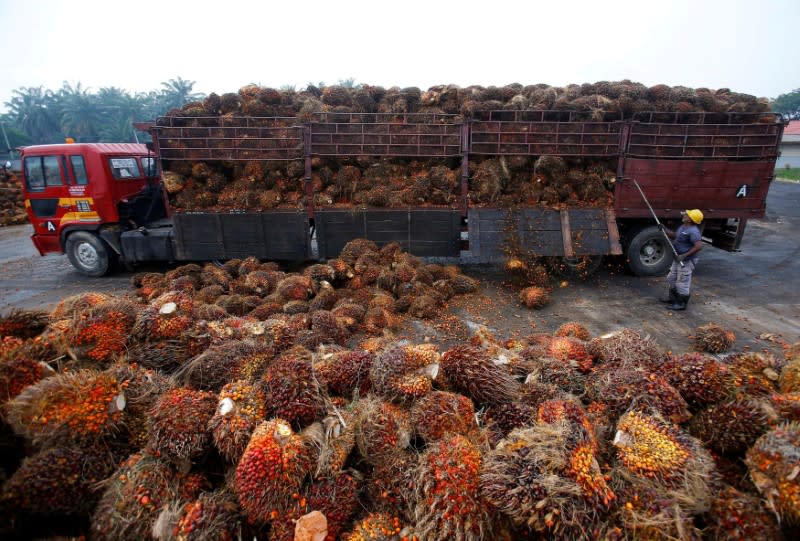 My comrades who are Free Market Libertarians and mutualists who oppose capitalism in favour of a cooperative marketplace, will find much to praise in this new farmers movement. It poses a real alternative to capitalist globalization and corporatist free trade. None other than creation of a new movement for a cooperative commonwealth.
My comrades who are Free Market Libertarians and mutualists who oppose capitalism in favour of a cooperative marketplace, will find much to praise in this new farmers movement. It poses a real alternative to capitalist globalization and corporatist free trade. None other than creation of a new movement for a cooperative commonwealth.
The latest attempt to destroy the Wheat Board in Canada is an example of the attack by the State on small farmers in favour of the Agribusiness cartels in the developed world. The Green Revolution, the push for GMO crops and patents on crops as well as using arable land for production for export; palm oil, are examples of non sustainable agribusiness versus the sustainable production of local farmers.
The recent Fraser Institute report by Preston Manning and Mike Harris calling for the end of supply management, the Wheat Board , and subsidies in the market place for farmers, does nothing but open up the farm marketplace to the agribusiness oligopolies. Ironic since Manning's daddy ran a party; Social Credit, made up of farmers that saw these same oligopolies as enemies of a producer run economy.
 The fact is that the majority of farmers in the world are family farmers, not far removed from their peasant roots. It is the peasantry that provides the basis for the survival of the food economy. But with the advent of capitalist globalization the peasantry has become a new force in the world economy as Warren Bellow points out.
The fact is that the majority of farmers in the world are family farmers, not far removed from their peasant roots. It is the peasantry that provides the basis for the survival of the food economy. But with the advent of capitalist globalization the peasantry has become a new force in the world economy as Warren Bellow points out.
It is agricultural reform, the privatization of the inherent collectivism of peasant farming, the enclosure of common lands that led to the creation of capitalism in Britain. Forced off the land the peasants move to the cities to look for work becoming the proletariat.
But not all have done so, since it is the farmers who support the cities with their food production. And forced by globalization to collectivize farmers are reforming cooperatives to deal with the new demands of the marketplace.
Thai pig farmers protest at CPF headquarters
S. Korea may allow farmers to export locally grown rice: gov't source Farmers Cooperative Extends Rollout Of SOA Tool
Connecting Coffee Growers and Drinkers
Cameroon: Coffee - Reasons Behind Poor Performance
Phoenixville Farmer's Market returns to town for sixth season
Innovations in rural financial system inPunjab
What began in England over 400 hundred years ago is now writ wide across the globe. It is not Free Trade nor Free Markets but the concentration of capital and its power to monopolize the market. It is the transformation of agriculture from sustainable economics to the economics of unrestrained growth. Thus the land, people and environment suffer as we see in Indonesia as the islands there burn for the sake of the agribusiness palm oil industry.
Whereas export crops like organic and fair trade coffee have become a basis for sustainable export farming, which can support sustainable agriculture as well as meet the farmers need to be part of a global market place.
Free Trade vs. Small FarmersWalden Bello is Executive Director of Focus on the Global South, a Bangkok-based research and advocacy institute, and a Professor of Sociology at the University of the Philippines at Diliman.
The main battle cry of Via Campesina, whose coordinating center is located in Indonesia, is “WTO Out of Agriculture” and its alternative program is food sovereignty. Food sovereignty means first and foremost the immediate adoption of policies that favor small producers. This would include, according to Indonesian farmer Henry Saragih, Via's coordinator, and Ahmad Ya'kub, Deputy for Policy Studies of the Indonesian Peasant Union Federation (FSPI), “the protection of the domestic market from low-priced imports, remunerative prices for all farmers and fishers, abolition of all direct and indirect export subsidies, and the phasing out of domestic subsidies that promote unsustainable agriculture.”
Via's program, however, goes beyond the adoption of pro-smallholder trade policies. It also calls for an end to the Trade-Related Intellectual Property Rights regime, which allows corporations to patent plant seeds, thus appropriating for private profit what has evolved through the creative interaction of the natural world with human communities over eons. Seeds and all other plant genetic resources should be considered part of the common heritage of humanity, the group believes, and not be subject to privatization.
Agrarian reform, long avoided by landed elites in countries like the Philippines, is a central element in Via's platform, as is sustainable, ecologically sensitive organic or biodynamic farming by small peasant producers. The organization has set itself apart from both the First Green Revolution based on chemical-intensive agriculture and the Second Green Revolution driven by genetic engineering (GE). The disastrous environmental side effects of the first are well known, says Via, which means all the more that the precautionary principle must be rigorously applied to the second, to avoid negative health and environmental outcomes.
The opposition to GE-based agriculture has created a powerful link between farmers and consumers who are angry at corporations for marketing genetically modified commodities without proper labeling, thus denying consumers a choice. In the European Union, a solid alliance of farmers, consumers, and environmentalists prevented the import of GE-modified products from the United States for several years. Although the EU has cautiously allowed in a few GE imports since 2004, 54% of European consumers continue to think GE food is ”dangerous.” Opposition to other harmful processes such as food irradiation has also contributed to the tightening of ties between farmers and consumers, large numbers of whom now think that public health and environmental impact should be more important determinants of consumer behavior than price.
More and more people are beginning to realize that local production and culinary traditions are intimately related, and that this relationship is threatened by corporate control of food production, processing, marketing, and consumption. This is why Jose Bove's justification for dismantling a MacDonald's resonated widely in Asia: “When we said we would protest by dismantling the half-built McDonald's in our town, everybody understood why -- the symbolism was so strong. It was for proper food against malbouffe [awful standardized food], agricultural workers against multinationals. The extreme right and other nationalists tried to make out it was anti-Americanism, but the vast majority knew it was no such thing. It was a protest against a form of production that wants to dominate the world.”
Many economists, technocrats, policymakers, and urban intellectuals have long viewed small farmers as a doomed class. Once regarded as passive objects to be manipulated by elites, they are now resisting the capitalist, socialist, and developmentalist paradigms that would consign them to ruin. They have become what Karl Marx described as a politically conscious “class-for-itself.” And even as peasants refuse to “go gently into that good night,” to borrow a line from Dylan Thomas, developments in the 21st century are revealing traditional pro-development visions to be deeply flawed. The escalating protests of peasant groups such as Via Campesina, are not a return to the past. As environmental crises multiply and the social dysfunctions of urban-industrial life pile up, the farmers' movement has relevance not only to peasants but to everyone who is threatened by the catastrophic consequences of obsolete modernist paradigms for organizing production, community, and life.
At this week's intergovernmental meeting in Rome to assess progress towards the pledge to halve hunger by 2015, the mood was sombre. Figures from the UN's Food and Agriculture Organisation (FAO) show not a reduction but an increase of more than 25 million chronically undernourished people since 1996. The figure, now at more than 850 million, is testament to how current global policies are consigning the hungry to stay hungry.So what is going wrong? In 2002, when the UN World Food Summit pledge was last reviewed, the parallel Forum for Food Sovereignty, organised by non-governmental groups representing small farmers and those who feel the sharp end of hunger directly, concluded that the problem was not a lack of political will, as the FAO asserted, but the opposite. Trade liberalisation, industrial agriculture, genetic engineering and military dominance, it said, were now the main causes of hunger.
The farmers, from 30 countries, who participated in the conference were eloquent about how farming for small producers is more than just a food production system. Edgar Gonzales Castro, from Peru, said his vision of the future was "traditional" agriculture aimed at satisfying the needs of farmers, rather than generating profit. "What matters is that, on the family plot of land, farmers and their families have a range of crops to fill the cooking pot," he said.
"When governments decide to hold public consultations to help guide their decisions, policy experts as well as representatives of large farmers and agrifood corporations are usually centre stage, not small-scale producers, consumers and their organisations," says Pimbert.
The message of the report is that small-scale farmers - the majority of growers in the world - want radically different policies from those being promoted by their governments. The call is for policies to start from the perspectives of food producers and consumers rather than the demand for profit.
If "one-planet farming" means that western governments will only support farming practices that provide healthy, local food, maintain livelihoods for local producers and conserve resilient landscapes, then there is common ground with small-scale farmers. But if it means a uniform system for all, this will accelerate the hunt to source food globally and as cheaply as possible.
This will result in a continuing decline in food quality, with ever higher social and environmental costs, and be lorded over by fewer and fewer transnational agribusinesses. It would lead both to greater obesity and greater starvation, and see the eradication of more farmers and further loss of farmland.
Farmers' Views on the Future of Food and Small Scale Producers is at http://www.iied.org/pubs/pdf/full/14503IIED.pdf
Friends of African Farmers & Fishermen
Friends of African Farmers & Fishermen is a Non Profit local community organisation formed by local women and men who are farmers and fishermen. Due to increasing poverty in the area, the local people formed this organisation of Volunteers to help themselves. Due to lack of money and machinery for farming and fishing, wish to appeal for donations of Farm Machinery ie, tractors, irrigation equipment etc. Donations for our Agricultural and development projects in Volta Region of Ghana. To help women and children to have food to eat.Train the young women and youth to acquire the needed skills. To also help farmers with farming machinery and fishing equipment. This would generate income for the local people.Non Profit Organisation.SEE:IWD Economic Freedom for Women
Water War
WTO: Privatization of Water
Is There a Silver Lining to the WTO Talks? No
Find blog posts, photos, events and more off-site about:
Canada, family-farm, farming, agriculture, WTO, subsidies, farm-crisis, producers, marketing-boards
primates, organutan, , ADM, ArcherDaniels Midland, , bio-fuels, Canada Wheat Board, , capitalism, Cargill, , ecology, , Environment, , Green, green capitalism, Indonesia, Kyoto, palm oil, , socialism, sustainable, workers control,
migration, immigration, Canada, USA, Europe, free-labour, labor, mutitude, Negri, Hardt, Empire, illegal, aliens, sans, papier,
market, cooperation, free-mmarket, agora, agorist, left-libertarian, libertarian, anarchy, anarchism, coops, cooperatives,, counter-economics, capitalism, anti-capitalism,



